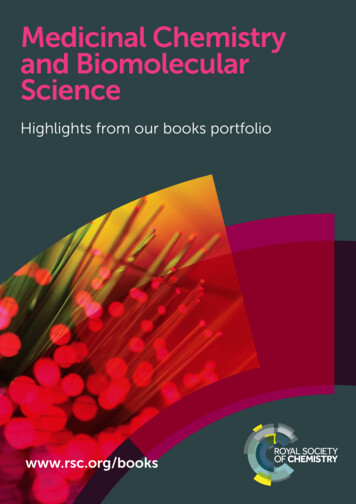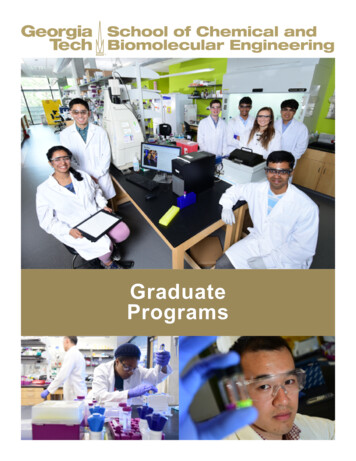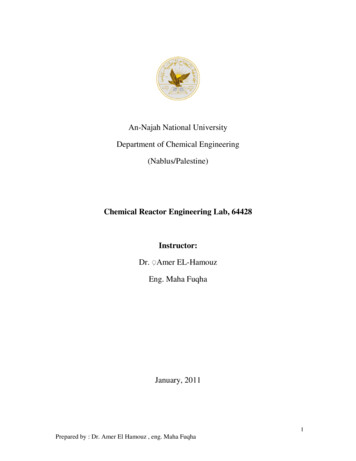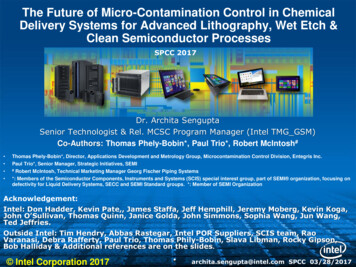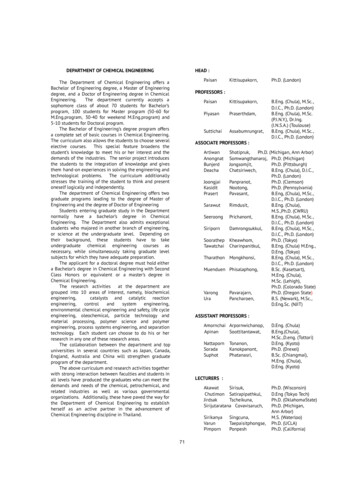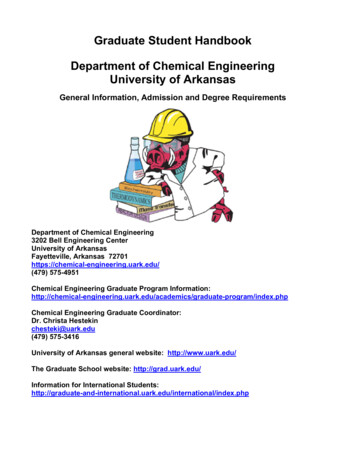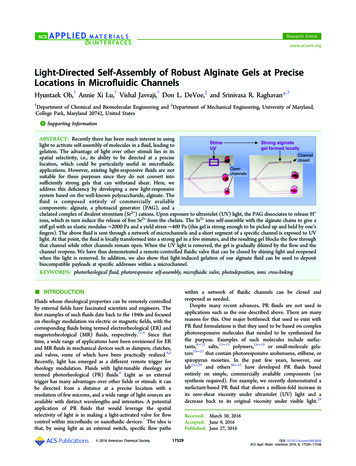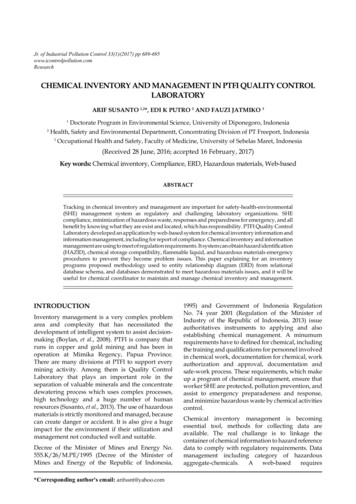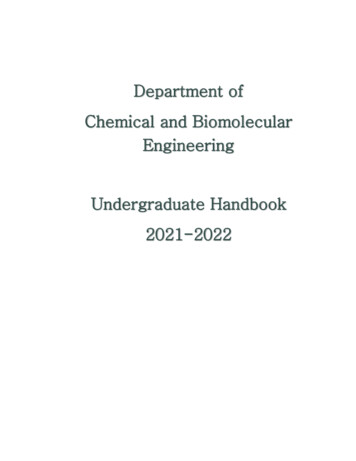
Transcription
Department ofChemical and BiomolecularEngineeringUndergraduate Handbook2021-2022
IntroductionWelcome to the Department of Chemical and Biomolecular Engineering at Clarkson University!Chemical engineering merges the application of chemistry and biology with mathematics and physics tocreate and develop new engineering platforms, theories and products. It is a versatile discipline offeringopportunities for graduates in traditional and emerging markets, such as in the design of plastic parts forautomobiles and aircraft, specialized fuels and biofuels, biomaterials, therapeutic proteins and otherdrugs, processed foods, computer chips, paints, fibers, batteries and solar cells. Example tasks thatchemical engineers direct include product development, process design, manufacturing, quality control,pollution control, marketing, and technical sales. Why is Clarkson a great place to prepare for thatcareer? Because we provide a challenging curriculum in a supportive environment and encourage theindividual development of each student.Upon graduation, some of our students seek employment directly, while others go on to graduate schoolor other professional programs (e.g., medical school, law school). Chemical engineering truly opens thedoor to many career choices! To prepare for these diverse career paths, your education will includefundamentals of chemistry, applied math, science and engineering with hands-on practical experience.In addition, the curriculum is well rounded with course requirements in the liberal arts, includinghistory, ethics, and communications; these courses are vital towards your development as a professionalengineer able to make significant, meaningful contributions to society.This handbook has been written to answer questions that you might have upon entering ClarksonUniversity in the Chemical and Biomolecular Engineering Department. I encourage you to use thishandbook as a reference source throughout your career here. You will find information about academicadvising, the curriculum, some Clarkson services, special programs, and advice about semesterplanning. If the information you need is not present, or you require more details, consult the referenceslisted on page 18; they will lead you to the information you need. If these sources lack the answer youare looking for, see your advisor, they are always willing to help you. If you cannot locate your advisor,contact the department office (220 CAMP, Tel. 315-268-6665).Again, welcome to the Department of Chemical and Biomolecular Engineering, and I look forward tomeeting you. All the best for the upcoming academic year!Elizabeth J. Podlaha-MurphyDepartment Chair
Table of ContentsIntroduction . 0Chemical Engineering Program Educational Objectives (PEOs) . 3Being a Student . 3Introduction . 3Self-reliance . 3Professionalism . 3Code of Ethics . 4Advisors . 4Introduction . 4Advisor–Student Relationship . 4What is the Advisor’s Responsibility? . 5What is the Student’s Responsibility? . 5Curriculum . 5Introduction . 5Chemical Engineering Curriculum . 6Requirements of the Clarkson Common Experience . 6Other Electives . 9Special Programs . 9Certificate Programs . 9Chemical Engineering Honors Program . 9Biomolecular Engineering Concentration . 10Minors . 10Biomedical Engineering Minor. 10Business . 10Environmental Engineering . 10Environmental Policy. 11Environmental Science . 11Liberal Arts . 11Materials Engineering Minor . 11Mathematics . 11Physics . 11Sustainable Energy Systems Engineering . 11Other Areas of Study . 11Dual Degree . 11Second Degree . 12Double Majors . 12Engineering MBA-MS 4 1 Program . 12Student Academic Records . 12Changing Majors. 12Transfer Credit . 12Cross Registration . 131
English as a Second Language Test . 13Fundamentals of Engineering Exam (FE Exam) . 13Career Planning. 14Cooperative Education Program . 14Study Abroad Program . 14Societies and Activities . 14Professional Societies . 14Honor Societies . 15Clarkson Services. 15The Student Administrative Services Center . 15The Counseling Center . 15Student Success Center . 16The Student Health Center . 16The Writing Center . 16Career and International Center . 16Extracurricular Activities . 16References . 16Important Phone Numbers . 17Chemical and Biomolecular Engineering Department: . 17Chair:. 17Executive Officer: . 17Department Administrative Assistant: . 17Emergency: . 17Faculty . 18APPENDIX AChemical Engineering CurriculumTypical Transfer Student CurriculumBiomolecular Engineering ConcentrationBiomedical and Rehabilitation Engineering (BRE) MinorSustainable Energy Systems Engineering MinorMaterials Engineering ConcentrationEnvironmental Engineering ConcentrationAPPENDIX BFormsAPPENDIX CAIChE Code of EthicsHandbook 2021-20222
Chemical Engineering Program Educational Objectives (PEOs)Chemical Engineering Program graduates are expected to:1. practice chemical engineering* in continuing and emerging fields and/or2. be successful in pursuing advanced degrees3. be motivated to continually develop their knowledge and skills by, for example, takingcontinuing education or industry training course(s), and acquiring professionalengineering certification4. contribute to society and the engineering profession.* Here, we define chemical engineering as the discipline that requires a thorough grounding inchemistry and a working knowledge of advanced chemistry; material and energy balancesapplied to chemical processes; thermodynamics of physical and chemical equilibria; heat, mass,and momentum transfer; chemical reaction engineering; continuous and stage-wise separationprocesses; process dynamics and control; process design and appropriate modern experimentaland computing techniquesBeing a StudentIntroductionYou may have already heard from friends, family members, or guidance counselors that you willexperience a different form of education when you enter college; it is not like high school. Now,that does not imply that you should be apprehensive about college, but it does mean that youshould keep your eyes open to the new environment and learn to adjust.Self-relianceDuring the next four years, you will find yourself gaining more and more self-reliance. Butself-reliance does not mean that you have to do everything yourself; it does mean that you askfor help when you need it and stand on your own two feet when you do not. Developing selfreliance should be one of your goals in college.ProfessionalismOne adjustment to college is to think of yourself as a student-professional, a student who will bea professional engineer. In any professional position, there are certain expectations that you mustfulfill. The best way to meet these expectations is to keep on top of things; do not let yourself fallbehind.Also, go to classes prepared; have all your work and reading done, and have questions ready.Participate in the discussions, practice the problems the professors assign, and push yourself todo your best. Make the best of every opportunity offered to you. You are building the base foryour professional career; build a strong base.The faculty may not always cover everything you need to know in class, so study beyond thelecture. You will find that the faculty are more like guides, and you have to be both the teacherHandbook 2021-20223
as well as the student more than you had to in high school. That is not saying they do not wantto help or teach; they are just forcing you to take responsibility for your education. They arepreparing you for the professional world where there are no obvious teachers. While you mayfeel some courses tax your abilities, the faculty are striving to give you the best opportunities foryour career.Near the end of the semester, you will fill out a “course evaluation form” for each of yourcourses. Your constructive comments regarding the course and the instructor are taken seriously.Your comments help your instructor to improve the course. In addition, the information on thecourse evaluation form is used in making salary, tenure, and promotion decisions.Code of EthicsClarkson values personal integrity. Matriculation at Clarkson carries with it the obligation that astudent will not claim as his or her own, the work of another, or any work that has not beenhonestly performed, will not take any examination by improper means, and will not aid and abetanother in any dishonesty.AdvisorsIntroductionGuidance in selecting from the variety of career paths and course offerings is always availablefrom your family, your roommate, your professors, and most importantly, from your facultyadvisor. Each chemical engineering major has been assigned an advisor. All advisors are facultymembers of the Chemical and Biomolecular Engineering Department and have offices in theCAMP building. Your advisor will be your primary link with the Chemical and BiomolecularEngineering Department, particularly in your freshman year when you take relatively fewengineering courses. Try to get to know your advisor early and well.You may wish to change your advisor, perhaps because you have developed career interests thatoverlap those of another member of the ChBE faculty, or for other reasons. To make a change,go to the ChBE Department Office, 220 CAMP. Changing an advisor is not difficult; however,the department would like to be aware of any potential conflicts or problems that may haveoccurred.Advisor–Student RelationshipVisit your advisor more frequently than once a semester so that they will become familiar withyou, and you with your advisor. This will make the advising process easier and more productive.For example, your advisor will be able to write more effective employment or scholarshiprecommendations for you if they know you well. Advisors want to help, but it is important tonote that they also have many other things to do. Like you, their time is restricted. So, call aheador email for an appointment. That way, they are not caught off guard and can be prepared for themeeting with you.Handbook 2021-20224
What is the Advisor’s Responsibility?The advisor is there to help you; help may include career advice or help in choosing courses. Alladvisors meet with their advisees during course selection week. Your advisor will email youinstructions for online appointment scheduling (using, for example, Google calendar) or have asign-up sheet posted outside of their office door before course selection week so that you canmake an appointment. The advisor prepares for these meetings by knowing the curriculum well.That means knowing substitute courses, course options available, and the best courses for acertain area of interest. Finally, the advisor must know you, the student. Knowing your goals andinterests will help them to suggest courses that suit you. After discussing your curriculum, theadvisor will clear you for course selection using myCU.Your course schedule can be changed through the completion of an Add/Drop form. This form isavailable at ms/. Copies are also available in thedepartment office. Your advisor needs to sign this form.What is the Student’s Responsibility?The student, not the advisor, is responsible for meeting Clarkson’s graduation requirements.Therefore, begin now to plan your Clarkson career. Then you can go into the course selectionmeeting with your choices for classes pre-selected. Try to see your advisor early in the semester,as was mentioned above. That way many details and problems can be ironed out before thehectic course selection period. Course selection advising is held in March for the fall semesterand in late October for the spring semester. Consult the ChBE curriculum sheet (Appendix A) toplan ahead. At course selection time, visit the SAS webpage rvices-sas) to learn about course offerings for the next semester.Planning ahead is often of particular importance to transfer students. Within the two andsometimes fewer years that transfer students need to complete degree requirements, a carefullyplanned sequence of courses is often necessary to take the prerequisite courses needed for moreadvanced courses of particular interest.CurriculumIntroductionThis section includes the requirements for degree completion, the elective options, specialinterest concentrations, the Chemical Engineering Honors Program, information concerning theClarkson Common Experience, and the Fundamentals of Engineering (FE) Exam. Academicoptions beyond the major include minors, concentrations, dual degrees, a second degree, anddouble majors. These are all explained below.Course descriptions may be found on the SAS website. Click on the Course Descriptions andClass Schedules link. Course information may also be obtained at the Student AdministrativeServices (SAS) Center, Graham Hall, or in the Chemical and Biomolecular EngineeringDepartment office, 220 CAMP.Handbook 2021-20225
Chemical Engineering CurriculumThe Chemical Engineering curriculum for both traditional and transfer students is outlined inAppendix A. Any student can take 19 credit hours a semester. Beyond this, the student’sadvisor must approve and must inform the Student Administrative Services in writing. Anadditional tuition fee will be charged per credit hour over 19 credit hours a semester. A studentmust be registered for 12 credits to be classified as a full-time student. This could be importantin matters of financial aid and health insurance.Requirements of the Clarkson Common ExperienceAll Clarkson students must satisfy the requirements of the Common Experience.First Year Seminar (FY 100)First Year Seminar treats personal and social adjustment topics as well as Clarkson values,ethics, and diversity. [Fall semester] [Required only for first-year students, i.e., anyone enteringClarkson with fewer than 24 credit hours. The 1 credit earned in this course will not be countedtoward the 120 credits required for graduation.]The Clarkson Seminar (UNIV 190)The Clarkson Seminar welcomes first-year students into a world of cultures, histories, and theglobal forces that will shape their personal and professional lives beyond Clarkson. Studentswill learn to define issues within a broad cultural context and gain experience evaluating andinterpreting literary and nonliterary texts. [Fall Semester]Knowledge Areas and University CoursesStudents must achieve learning outcomes in six broad areas of knowledge listed below. Theknowledge area requirement is met by completing five individual courses, including at least oneUniversity Course that encompasses two areas of knowledge. Together, these courses must coverat least four of the following areas of knowledge:Cultures and SocietiesContemporary and Global IssuesImaginative ArtsScience, Technology, and SocietyEconomics and Organizations,Individual and Group Behavior.All students must take at least one University course. University Courses will address learningoutcomes in two of the six areas of knowledge. University courses are multidisciplinary, andstudents observe and participate in the interaction of disciplines.A list of Knowledge Area courses can be found -technology-courses/Handbook 2021-20226
Mathematics, Science and Technology CoursesStudents must achieve learning outcomes in basic mathematics, science and technology bycompleting five courses in these areas. Students develop quantitative literacy through the studyof mathematics, including probability and statistics. Students must take two courses inmathematics as specified by the major. Students develop an understanding of the principles ofscience and technology through two natural science courses, at least one of which must have anintegrated laboratory component. Students gain an understanding of how technology isdeveloped through a course that addresses the theme of technology serving humanity. Chemicalengineering students meet the requirements with their required courses.CommunicationsClarkson places a strong emphasis on developing students’ abilities to communicate effectivelyin a variety of contexts using diverse forms of communication. Students must completecoursework that carry a total of at least six communications points. Courses and activities with acommunications component are identified as carrying either one or two points. At least twopoints must come from within the student’s major discipline in a course at the 300 or 400 level.Chemical engineering students will earn one communication point in CH350 and twocommunication points each in CH370, CH410, and CM244. Therefore, chemical engineeringstudents meet the requirements with their required courses.Major Field of StudyA significant characteristic of the Common Experience is integrating requirements from bothoutside and within a major field of study. Each student pursues a degree program in a major fieldand must complete a set of prescribed courses to demonstrate mastery of that field. As part ofthese courses, students achieve outcomes to meet the requirements of the Common Experience asdescribed below.Information Technology ExpertiseStudents will gain expertise in using information technology and computational softwareappropriate to their major field of study.CommunicationsStudents must complete course work in the major field at the 300 or 400 level that includesdiscipline-specific communication for a total of at least two communications points.Professional RequirementThe Professional Requirement incorporates learning outcomes involving professionalism, ethics,and diversity. These outcomes include understanding the concepts of professionalism,professional responsibility, and professional ethics, and knowing how the student’s professionalHandbook 2021-20227
community promotes, supports, and enforces these concepts. Students should develop anappreciation for the value of diversity in the workplace.Professional ExperienceAll students participate in a project-based professional experience following the first year, suchas co-op, internship, directed research, or community project related to the student’s professionalgoals.ES499 Professional Experience for Engineering Majors, a 0 credit pass/no-credit course, is usedto matriculate the Professional Experience requirement. Students will typically enroll in ES499during the junior or senior years after completing an internship or co-op experience, orconducting research with a faculty member that spans at least a semester or a summer. TheCareer Development Center provides help and guidance for finding appropriate co-ops andinternships. The reporting of professional experience is done online through Handshake(http://clarkson.joinhandshake.com). After submitting the “Request an Experience” form, youwill receive an email confirming your submission and outlining the next steps. Once you havecompleted your experience, enroll in ES499 during the subsequent semester. At the end of thesemester, the Department Executive Officer will validate you have completed the requirementand give a pass grade for this course. The completion of ES499 is required for graduation.Bachelor’s Degree Graduation Requirements1. At least 120 credit hours.2. At least a 2.000 cumulative average.3. At least a 2.000 cumulative average in the major field of study.4. Meet the requirements of the Clarkson Common Experience.5. Meet the requirements for a degree program as determined by the offering department orschool.6. A student entering as a first-semester freshman must have been in residence for at leastfour semesters, including the final undergraduate semester; or, if entering with advancedstanding, have completed at least half the remaining upper-level undergraduate work inresidence at Clarkson. The program must include a minimum of two semesters (30 credithours), including the final undergraduate semester.ESL RequirementStudents for whom English is a second language must take an English language placementexamination upon entering Clarkson. Based on the outcome of this examination, a student maybe required to complete one or more EAP courses prior to enrolling in the Clarkson Seminar orany course assigned one or two communications points.Handbook 2021-20228
Other ElectivesThe math, engineering science, technical, and undesignated electives should be carefully chosento further career goals. It is recommended that students concentrate electives rather than makerandom selections. For example, if you are planning to attend medical school, you will probablyfill your technical and undesignated electives with courses related to biology and biochemistry.The two engineering science electives must be taken from two of three categories: electricalscience, materials science, and mechanics. Technical electives are any science, engineering ormath course. Engineering electives are any engineering course, i.e., courses with designator AE,BR, CE, CH, EE, ES, or ME. Safety-related courses such as EHS309 and EHS406, andsustainability and environmental engineering courses such as EV390 and MP401, also aresuitable engineering electives.A minimum of 30 semester credit hours of a combination of mathematics and basic sciences, anda minimum of 48 semester credit hours of engineering topics appropriate to the chemicalengineering program, consisting of engineering and engineering design, and utilizing modernengineering tools, must be completed.Coursework beyond the 120 credits required for graduation can be taken as “Pass/No Credit.” APass/No Entry form is available at ms/. This formmust be submitted to Student Administrative Services within the first two weeks of classesindicating approval of the advisor.You can use your electives to work towards a concentration, minor, dual degree, second degree,or double major. If you are planning to go to graduate school or want a de
Handbook 2021-2022 3 Chemical Engineering Program Educational Objectives (PEOs) Chemical Engineering Program graduates are expected to: 1. practice chemical engineering* in continuing and emerging fields and/or 2. be successful in pursuing advanced degrees 3. be motivated to continually develop their knowledge and skills by, for example, taking
